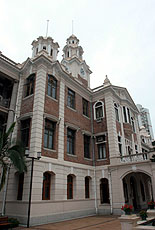 |
| Research hub: Of the 836 projects funded by the Research Grants Council, 215 are from Hong Kong University. |
|
|
The Research Grants Council announces that 836 projects by University Grants Committee-funded institutions have been approved, involving $489.3 million, 21% higher than last year.
The council received a record high of 1,969 Competitive Earmarked Research Grant applications submitted by academic staff of the eight committee-funded institutions, up 1% on last year, with funding of about $1.759 billion sought. After rigorous international peer-review, the council decided to fund 836 projects. The overall success rate was 42%.
Of the 836 projects, 327 concerned engineering; 185 biology and medicine; 167 humanities, social sciences and business studies; and 157 physical sciences, chemical engineering and mathematics.
Analysed by institutions, 215 projects are from Hong Kong University, 187 Chinese University, 170 the University of Science & Technology, 123 Polytechnic University and 98 City University. Baptist and Lingnan Universities account for 38 and five projects. Click here for more details.
Average funding
Council chairman Professor Roland Chin said the committee has allocated an additional $100 million annually to the council to support research in 2006-08. Most of the additional funding, $85 million, has been used for Competitive Earmarked Research Grants. The average funding level per project has risen 6% to $585,000.
He said about 100 more projects have been supported this year, as compared with the 734 projects funded last year, a 14% surge.
Noting innovation, research capabilities and knowledge transfer are the keys to success in the intensely competitive global arena, Professor Chin stressed it is important to continue investment to support high-quality research to keep Hong Kong competitive as a knowledge-based economy.
On funding for the second round of the Public Policy Research Funding Scheme, 16 out of the 66 research proposals received have been given funding approval, involving $7.1 million. The projects cover a wide spectrum of policy areas, including educational inequality, policy in support of families, urban planning, population aging and the healthcare system. Details of these funded projects are available here.
Go To Top
|



